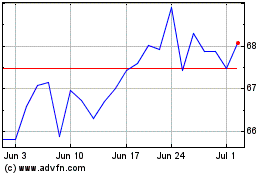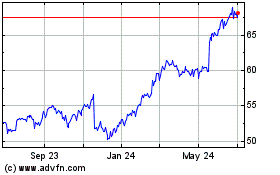By Paul Page
Sign up:With one click, get this newsletter delivered to your
inbox.
Wal-Mart Stores Inc. is trying to use e-commerce to remake its
identity with consumers -- and with suppliers. The retailer is
buying up small, hip online retailers that appeal to wealthier
shoppers, the WSJ's Sarah Nassauer reports, in hopes of taking on
Amazon.com Inc. with nimble businesses that display goods not
usually found at Wal-Mart. The purchase this month of hipster
clothing website ModCloth follows Wal-Mart's earlier buys of
Moosejaw and ShoeBuy. The companies compete with the fast shipping
and large assortments of the big retailers by working outside the
mass-market mainstream. Wal-Mart hopes they can help solve a key
business problem: The retailer needs to match Amazon's broad scope
in products, but some suppliers don't want to display their goods
alongside Wal-Mart's discount-driven marketing or meet the
retailer's tough supplier terms. Wal-Mart insists it won't exert a
heavy controlling hand on its new acquisitions, but the company
will surely be tempted to bring the smaller operations into its
sprawling distribution channels.
The shipping economy is raising tough questions over state
taxes. A federal judge's ruling that United Parcel Service Inc.
failed to properly flag tobacco shipments from Indian reservations
into New York opens the carrier up to millions of dollars in
damages and penalties, the WSJ's Paul Ziobro reports, over claims
that it deprived the state and New York City of tax revenues. The
judge said UPS hadn't complied with a 2005 agreement to fix a
problem that arose from schemes to avoid high local taxes on
cigarette sales. A similar suit is pending against FedEx with
potentially big monetary claims. In each case, local authorities
say package carriers should be doing more to police the contents of
their shipments. FedEx has said enforcement must be balanced
against the privacy of its shipping customers. But the judge's
ruling in the UPS case says the parcel networks can't be used to
sidestep taxes.
China National Chemical Corp.'s $43 billion deal to buy Swiss
agro-giant Syngenta AG is putting concerns over
genetically-modified crops high on the menu in China. Syngenta is a
major producer of genetically-engineered seeds, and the WSJ's Brian
Spegele writes opposition to GMOs runs deep in China, where the
government bars use of such seeds for grains such as soybeans and
there is wide distrust of food supply chains. Still, China is
trying to boost agriculture production to feed a billion-plus
population, and ChemChina's acquisition figures prominently in the
effort. Backers say high-tech seeds improve farm yields, and China
could use them to boost harvests and avoid more imports. Many in
the agriculture business expect China's GMO policies to gradually
change once the Syngenta acquisition clears regulatory hurdles, but
the spread of biotechnology will still face hurdles that stretch
from China's rural communities to the popular hotpot restaurants in
cities.
TRANSPORTATION
YRC Worldwide Inc. hopes to make its trucking units move faster
by operating under like-minded technology discipline. The parent of
YRC Freight and other regional less-than-truckload divisions named
Jason Ringgenberg as chief information officer for the entire
business, the WSJ'S Angus Loten reports, the first time the trucker
has put someone in that role across the broader operation. Mr.
Ringgenberg had been CIO at YRC Freight and says the new role will
help establish common standards and functions across operations
that also include New Penn, Holland and other businesses as YRC
tries to move goods faster and more efficiently. Mr. Ringgenberg
says the company, which last year launched a service aimed at
cutting transit times, is investing in technology aimed at
"addressing last-mile deliveries and supporting ecommerce
growth."
QUOTABLE
IN OTHER NEWS
U.S. durable goods orders jumped sharply on a large gain in
aircraft and aviation parts orders in February. (WSJ)
A survey of eurozone manufacturing and services activity reached
its highest level since April 2011. (WSJ)
A Chinese court overturned a ruling against Apple Inc. over
iPhone patents, a win for the tech giant in one of its toughest
markets. (WSJ)
German industrial giant Thyssenkrupp AG is on the brink of
transforming from a steel business into a lean capital-goods
operation. (WSJ)
Uber Technologies Inc. pulled its self-driving cars from roads
after one was involved in an accident in Tempe, Ariz. (WSJ)
The U.S. ban on many carry-on electronics aboard Middle East
flights has created new headwinds for Persian Gulf airlines hurt by
the faltering oil economy. (WSJ)
The U.S. sanctioned 30 individuals and entities from 10
countries for transferring missile technology to Iran and flouting
export controls on Iran, North Korea and Syria. (WSJ)
The number of active U.S. oil rigs jumped by 21, more than
double the number working in May 2016. (WSJ)
Videogame chain GameStop Corp., hit hard by a shift to digital
downloads, will close at least 150 stores this year. (WSJ)
Schneider National Inc. expects to net about $281 million in an
initial public stock offering the trucking company plans in coming
weeks. (Milwaukee Journal Sentinel)
Amazon will start collecting sales taxes from all states with a
sales tax on April 1. (CNBC)
Trade experts say a U.S. border tax proposed by Republican
lawmakers would deepen divisions between big manufacturers and
their suppliers. (Reuters)
Hapag-Lloyd AG fell to a $100.5 million loss for 2016 but said
it is seeing stronger container shipping freight rates this year.
(Lloyd's List)
The Carlyle Group and Tiger Global invested a total of $100
million in Indian logistics company Delhivery. (Post &
Parcel)
A new UPS package handling facility in Arlington, Texas, will
add 1,000 jobs in the region. (Dallas Morning News)
DHL Freight is dropping its domestic and European pallet
consolidation service in the U.K., eliminating 400 jobs. (Lloyd's
Loading List)
Toyota Industries Corp. will acquire Vanderlande, a
Netherlands-based provider of air cargo automation equipment. (SHD
Logistics)
Full-year pre-tax profit at Singapore-based port terminal
operator PSA International fell 6% to $1.4 billion despite a 5.5%
gain in container volume. (Container Management)
Lloyd's of London is underwriting insurance for small retailers
against being kicked off Amazon.com Inc.'s marketplace.
(Bloomberg)
German candy company Haribo, the maker of gummy bears, plans to
open its first U.S. factory by 2020. (Agence France-Presse)
ABOUT US
Paul Page is deputy editor of WSJ Logistics Report. Follow him
at @PaulPage, and follow the entire WSJ Logistics Report team:
@brianjbaskin, @jensmithWSJ and @EEPhillips_WSJ and follow the WSJ
Logistics Report on Twitter at @WSJLogistics.
Subscribe to this email newsletter by clicking here:
http://on.wsj.com/Logisticsnewsletter .
Write to Paul Page at paul.page@wsj.com
(END) Dow Jones Newswires
March 27, 2017 06:25 ET (10:25 GMT)
Copyright (c) 2017 Dow Jones & Company, Inc.
Walmart (NYSE:WMT)
Historical Stock Chart
From Mar 2024 to Apr 2024

Walmart (NYSE:WMT)
Historical Stock Chart
From Apr 2023 to Apr 2024
